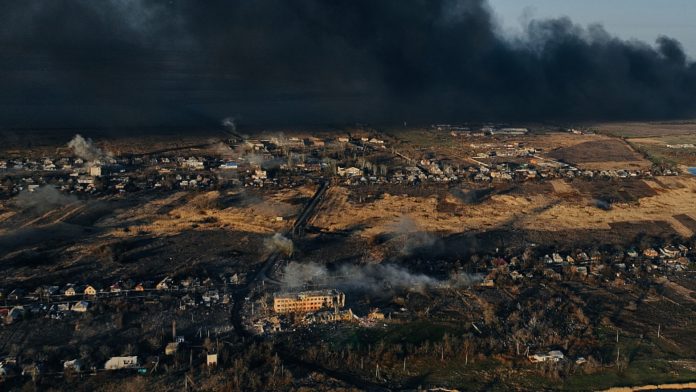Some soldiers from the 3rd Assault Brigade described how the final days went before Russia secured full control of Avdiivka, forcing Ukrainian military out, according to The Washington Post.
On 17 February, Russia gained full control of the eastern city of Avdiivka, a grievous defeat for Ukraine, which continued to move its forces into the city until the last minute in a desperate attempt to hold off the Russians. It is estimated that the Ukrainian troops’ retreat was disorganised, leaving dozens of people stranded as Russian troops advanced in seemingly endless waves.
Soldiers told about the last days spent under Russian assault in the former Ukrainian stronghold, confirming Ukraine’s disadvantage on the battlefield.
Major, 21, fought with Russian troops inside apartment blocks in the city and was nearly caught. In the second week of February, he arrived in the city and set up in an old two-storey student dormitory.
Eventually a group of well-trained Russian soldiers unleashed a barrage of rocket-propelled grenades on them, and soon they were forcing their way through the building. His unit was sent to one of the last lines of defence to cover the retreating troops, but soon the Russians were “raining down very targeted artillery fire on us,” he said.
But when his group finally left the city completely, he saw the column in front of him burst into flames after an artillery strike: “It was just a convoy of people. A convoy of the best men ever. And in front of our eyes, this convoy was destroyed by artillery. People of my age, between 20 and 30.”
Schultz, 23, arrived at the firing position inside the apartment building in the early morning hours of 9 February and worked with the major inside the two-story dormitory. For the next few days, however, “the Russians were trying to storm our positions, wave after wave after wave,” he says.
When the order to retreat came, he left in an armoured personnel carrier from which nothing could be seen but only sounds could be heard.
Kavkaz, 20, reports that about three quarters of the Russians they fought had decent military training. The rest were “just confused.” However, slightly more than half of his soldiers had combat experience.
“I believe the order should have been given earlier,” he added. “Even five hours earlier would’ve made a difference.”
Machine-gunner Bandit, 27, described that when he arrived in Avdiivka on 8 February for his first ever combat mission, he crossed the railway tracks towards a residential area and saw “a hellscape,” he said.
On their third day in the house, Russia launched a relentless assault on the positions using small arms, drones, mortars, artillery and aerial bombs, forcing them to retreat to another destroyed house nearby.
After receiving orders to retreat, he and his fellow soldiers took up positions along the tree line to cover the retreating Ukrainian troops. When cluster munitions rained down on them, his group commander told them not to wait for vehicles and just leave on foot. They walked through the shelling in the dark, trying to keep a distance of 5-10 metres between each soldier to reduce the chance of being spotted by the Russians.
Fedya, 24, drove into Avdiivka on 11 February and took up a position at a command center in the coke plant. But within days, it became clear that the Russians were gaining control of key areas and would soon be able to cut off all exits from the city. He watched as they closed in on the front line.
When the call came for the retreat, he instructed certain troops on how they should leave their positions.
If they had waited much longer, he said, evacuation would have become impossible. “It didn’t make sense to hold on until everyone was dead,” he underlined.
